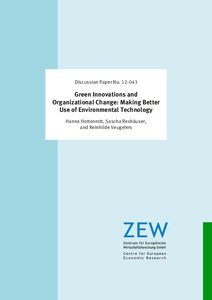Green innovations and organizational change: making better use of environmental technology
"That the successful use of process technology crucially depends on the right organizational infrastructure is known for a long time as well as the fact that the adoption of new process technology may need organizational change to be used in an efficient way. The strand of the literature dealin...
| Main Authors: | , , |
|---|---|
| Institution: | ETUI-European Trade Union Institute |
| Format: | TEXT |
| Language: | English |
| Published: |
Mannheim
2012
ZEW |
| Subjects: | |
| Online Access: | https://www.labourline.org/KENTIKA-19131649124919598219-Green-innovations-and-organiza.htm |
| Summary: | "That the successful use of process technology crucially depends on the right organizational infrastructure is known for a long time as well as the fact that the adoption of new process technology may need organizational change to be used in an efficient way. The strand of the literature dealing with productivity or competitiveness effects of environmental technology adoption, however, has largely neglected these aspects. Using data from the German part of the Community Innovation Survey (CIS 2008), this study aims at closing this gap in the literature. The central research question is whether firms that introduced greenhouse gas abatement technologies (CO2) into their production process can make more efficient use of such technology if it is introduced jointly with organizational change. The latter covers the introduction of new methods of process organization, the introduction of new forms of work management, and new methods of dealing with external relations.
As to bring this question to an empirical test, we model firms’ production function by relying on a standard Cobb- Douglas functional form augmented by firms’ endogenous decision variables concerning the introduction of CO2 abatement technologies (henceforth green innovations) and/or organizational change. In brief, we test whether firms that jointly adopted green and organizational innovations achieve higher productivity (i.e. produce more outputs with the same amounts of inputs) compared to other firms. As to take the endogeneity of the choice variables into account, we use the predicted probabilities from a discrete choice model as instruments for the endogenous innovation adoption variables in the production function approach. The discrete choice models include several determinants of the decision to introduce green or organizational innovations and furthermore accounts for the fact that both adoption decisions are not independently determined. Thus, both discrete choices are estimated jointly in a bivariate probit regression that provides predicted probabilities for any combination of green and organizational innovation adoption (i.e. neither of them, green only, organizational only, or both).
The empirical analysis provides strong and robust evidence for complementarity of green and organizational innovations with respect to firms’ productivity. On the one hand, we find that firms which introduced green technology without organizational change to have lower productivity compared to the control group, i.e. firms that introduced neither green nor organizational innovations. On the other hand, firms that introduced both types of innovations jointly enjoy a higher productivity compared to the control group. These results have important implications for the economically advantageous and sustainable introduction of environmental technology in the business sector. Changes in firms’ organizational structure appear crucial for using new CO2 abatement technologies in more efficient ways facilitating comparability of commercial and environmental goals." |
|---|---|
| Physical Description: | 26 p. Digital |

